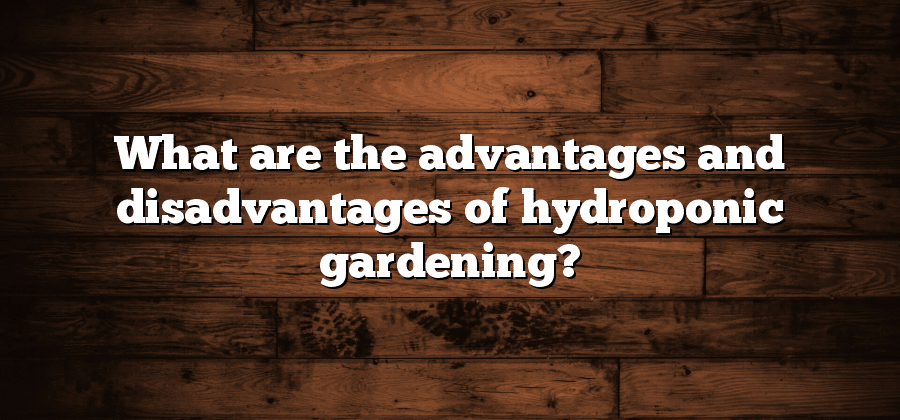– Efficient Water Usage
One of the significant advantages of hydroponic gardening is its efficient water usage. Unlike traditional soil-based gardening, where water can be lost through evaporation and runoff, hydroponic systems allow for the precise delivery and recirculation of water to the plant roots. This controlled environment ensures that only the necessary amount of water is delivered directly to the roots, minimizing wastage.
In hydroponic systems, water is constantly recirculated, reducing the need for frequent watering and preventing water from being wasted. This closed-loop system allows for continuous water recycling, ensuring that every drop is used efficiently. Additionally, because water is delivered directly to the root zone, there is minimal loss due to evaporation or absorption by weeds and surrounding plants. As a result, hydroponic gardening can help conserve this precious resource and promote sustainability in agricultural practices.
– Reduced Need for Pesticides
One major advantage of hydroponic gardening is its reduced need for pesticides. In traditional soil-based gardening, pests like insects, weeds, and fungi can become a significant problem, leading gardeners to use chemical pesticides to protect their plants. However, in hydroponic systems, there is no soil for pests to thrive in, greatly minimizing the need for pesticides. This is particularly beneficial for those concerned about the environmental impact of chemical pesticides and those looking to minimize their exposure to potentially harmful substances.
Moreover, the controlled environment of hydroponic systems allows for better pest management strategies. By closely monitoring factors such as humidity, temperature, and nutrient levels, gardeners can create conditions that are less conducive to pest infestation. Additionally, the closed-loop systems of hydroponics reduce the likelihood of pests entering the growing area, as there is no soil or organic matter to attract them. As a result, hydroponic growers can focus on preventive measures, such as implementing physical barriers and maintaining strict cleanliness standards, rather than relying heavily on chemical pesticides.
– Year-Round Production
One of the significant advantages of hydroponic gardening is its capability to provide year-round production. Unlike traditional soil-based gardening, where crops are limited by seasonal changes and weather conditions, hydroponic systems offer a controlled environment that allows for continuous growth and harvests. This means that regardless of the external climate, plants in a hydroponic setup can thrive and produce crops throughout the year.
By providing the ideal conditions for plant growth, such as temperature, light, and nutrient levels, hydroponics creates an environment that promotes accelerated growth and maximizes yield. This year-round availability of fresh produce can be particularly beneficial in regions with limited growing seasons or extreme climates. Additionally, the ability to sustain production year-round enables farmers and gardeners to have a consistent supply of fresh fruits, vegetables, and herbs, supporting local food security and reducing reliance on imported produce.
– Space and Location Flexibility
The flexibility in space and location is one of the key advantages of hydroponic gardening. Unlike traditional soil-based gardening, hydroponics allows for plants to be grown almost anywhere, as long as the necessary conditions can be provided. This opens up a world of possibilities for urban gardening, where space is often limited and soil quality can be poor. Hydroponics can be set up in a small apartment, on rooftops, or even vertically in order to maximize space utilization. This adaptability in location means that more people can engage in gardening, regardless of their living situation or access to fertile land.
Furthermore, hydroponic systems can be easily transported and relocated, making them ideal for temporary or mobile setups. This flexibility is particularly useful for farmers and gardeners who may need to adjust their growing operations due to changes in weather patterns, excessive sunlight exposure, or other environmental factors. By being able to move their hydroponic systems, growers can ensure the optimal growing conditions for their plants and mitigate any potential risks. Additionally, the ability to relocate hydroponic gardens can also allow for the exploration of different environments and microclimates, enabling growers to experiment with a wider range of plant species and varieties.
Disadvantages of Hydroponic Gardening:
Hydroponic gardening, though efficient and innovative, is not without its disadvantages. One major drawback is the initial cost of setting up a hydroponic system. The equipment needed, including pumps, grow lights, and nutrient solutions, can be quite expensive. Additionally, the installation and maintenance of such systems require specialized knowledge and skills, which may incur ongoing costs if outsourced to professionals. These financial considerations can pose a barrier for individuals or organizations with limited resources.
Another disadvantage of hydroponic gardening is the reliance on artificial environments. Since plants are grown without soil, the success of the garden depends heavily on factors that must be carefully controlled, such as temperature, humidity, and nutrient concentration. Any disruption or malfunction in the system can have a detrimental impact on the plants’ growth and overall health. Moreover, power outages or equipment failures can quickly compromise an entire hydroponic operation, leading to potential losses in terms of time, effort, and investment.






